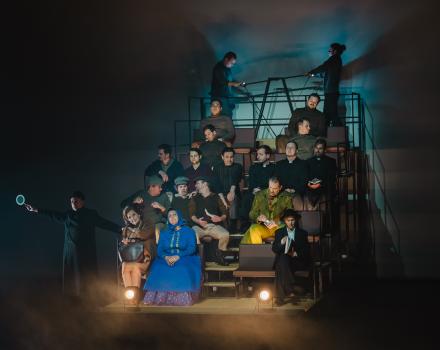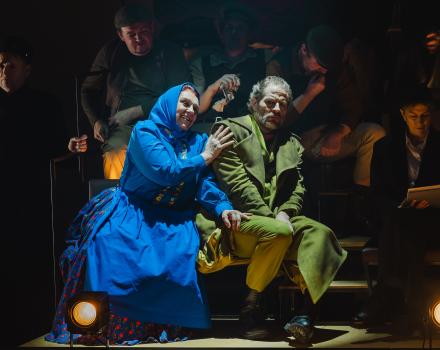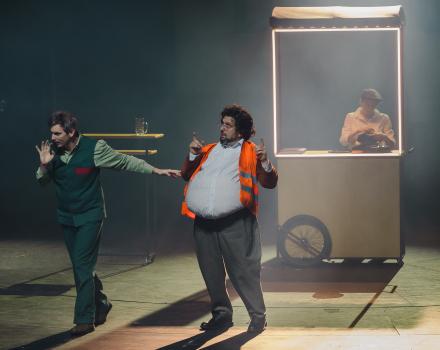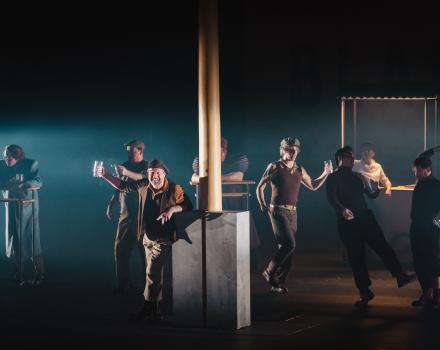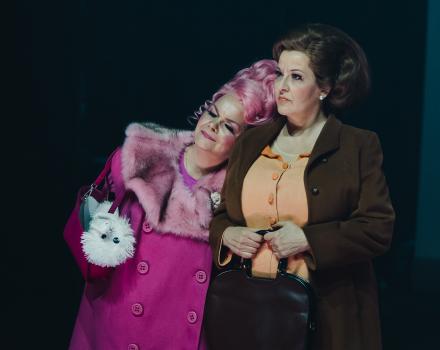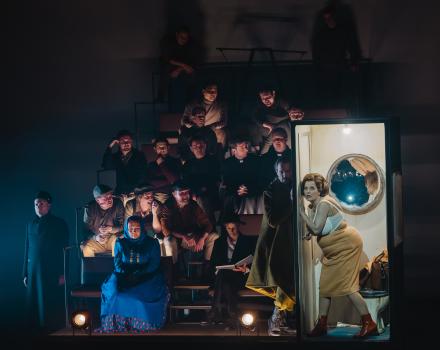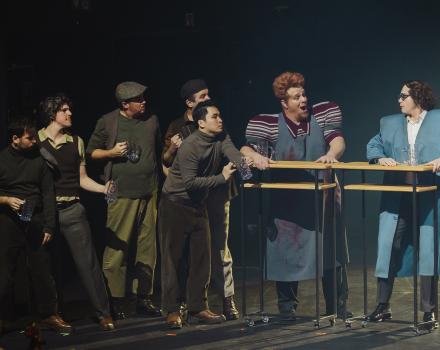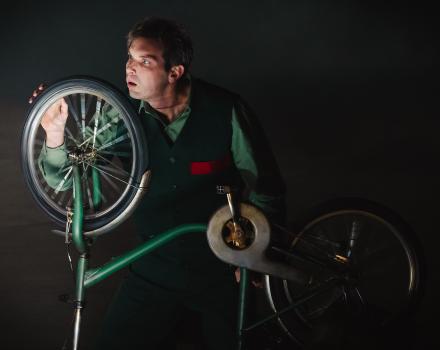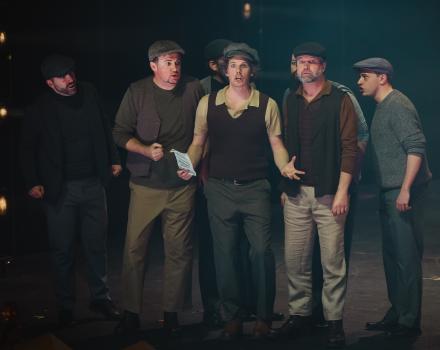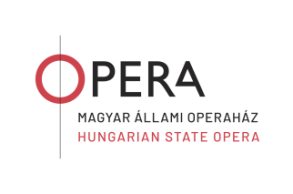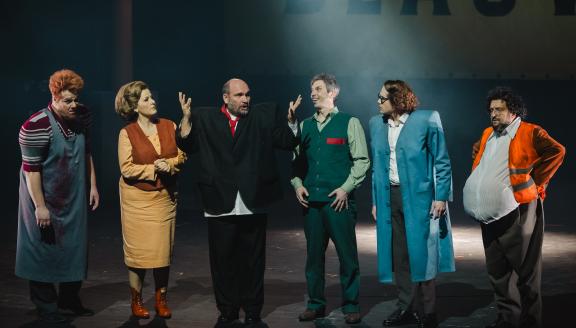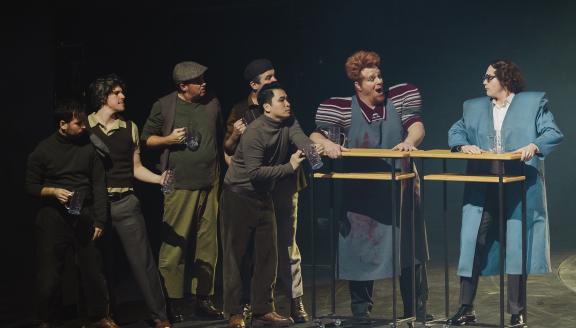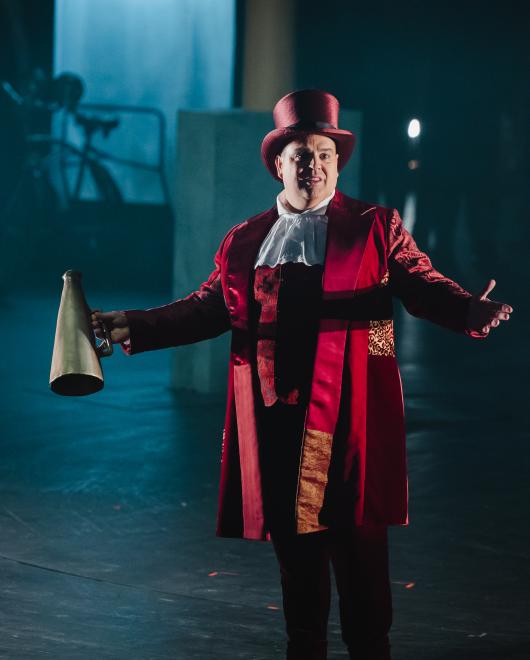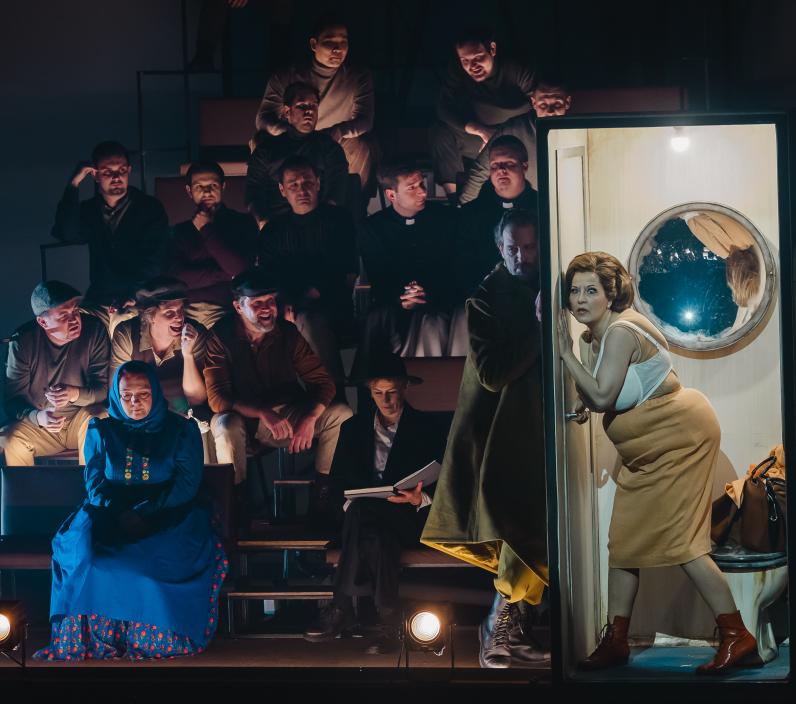
Péter Eötvös’s new opera takes us to a bare, grey world of an unknown yet familiar small town, and reveals the tragi-comedy world of the protagonist, newspaper delivery man, János Valuska. In the tradition of the Shakespearean fool, Valuska is different from the townspeople. He is an innocent, infatuated with astronomy and man’s position in the universe. The arrival in town of a circus - with, as star attraction, the world’s largest taxidermied whale - has explosive consequences.
With its world premiere on 2 December 2023, Valuska is an important event for the Hungarian State Opera and, more widely, for all those interested in opera today. Péter Eötvös, the internationally acclaimed composer who celebrates his 80th birthday in January 2024, was commissioned by the Hungarian State Opera in 2018 to compose his 13th opera and his first in Hungarian. It is based on the 1989 novel The Melancholy of Resistance by László Krasznahorkai, who won the International Man Booker Prize in 2015. ‘Valuska, a young man with a pure heart, becomes a victim of a manipulative society in the shadow of a stuffed whale’ says Péter Eötvös. He has transformed the novel into a performance that combines several genres of opera and theatre with the grotesque. This is a bare, grey world but one with a lot of humour, where the surreal turns painfully believable.
Cast
János Valuska | Zsolt Haja |
|---|---|
Hagelmayer / Narrator | Tünde Szalontay |
Mrs Pflaum | Adrienn Miksch |
Tünde | Tünde Szabóki |
A peasant woman | Mária Farkasréti |
Professor | András Hábetler |
Man in broadcloth coat / Senior officer | Krisztián Cser |
Director | István Horváth |
The Prince’s aide | Balázs Papp univ. stud. |
Nadabán | Lőrinc Kósa |
Mádai | András Kiss |
Volent | János Szerekován |
Ticket inspector | Zoltán Bátki Fazekas |
An officer | Attila Erdős |
Men | Benjámin Beeri Ninh Duc Hoang Long Gergely Halász univ.stud. Bence Pataki Gergely Ujvári Botond Pál Donát Varga |
Orchestra | Hungarian State Opera Orchestra |
Chorus | Hungarian State Opera Chorus |
| ... | |
Music | Péter Eötvös |
|---|---|
Text | Kinga Keszthelyi Mari Mezei |
Conductor | Kálmán Szennai |
Director | Bence Varga |
Sets | Botond Devich |
Costume | Kató Huszár |
Lights | Sándor Baumgartner |
Artistic assistants | Sylvie Gábor Andrea Valkai |
Musical assistants | Pálma Hidegkuti Jean Klára Bálint Zsoldos |
Assistant Conductor | Levente Zsíros |
Chorus Master | Gábor Csiki |
| ... | |
Videos
Story
János Valuska is, as it were, the noble fool of the village, a newspaper delivery man at the post office. He is different from the townspeople: he is not motivated by the desire for power, he is pure and innocent, unlike his mother, Mrs Pflaum, who is constantly at odds with her son. He is fascinated by the world and marvels at the beauty of the universe and the planets with an almost childlike naivety, he even tries to explain it to the local pub crawlers. Yet everyone remains impassive about these beauties, especially Tünde, the mayoress, who invites a travelling circus to the town with fatal consequences: in order to build something new, she must destroy the existing system, and the mob excited by the circus proves to be an excellent means to this end.
The main attraction of the circus is the world’s largest taxidermied whale, and the other one is rumoured to be a mysterious, perhaps non-existent, three-eyed, chirping Prince. An ideology anyone can embrace, anyone can cling to. After a terrible act of looting and arson, a new – military – order is established in the town, and Valuska is only saved by being locked up as a lunatic. Just as he used to visit Tünde’s husband, the retired, disillusioned, and embittered intellectual Professor, now it falls to the old teacher to visit Valuska in the asylum.
Insights
Composer Péter Eötvös on his opera
Valuska is your first opera in Hungarian, based on the novel The Melancholy of Resistance by László Krasznahorkai. Why this work?
I never thought of composing an opera in Hungarian when I started out for several reasons. On the one hand, following the success of Three Sisters, I kept getting commissions for operas in different languages. On the other hand, Bluebeard’s Castle by Bartók, which I have conducted several times, is so powerful and unique that I didn’t dare touch a Hungarian text. When I was honoured by Hungarian State Opera with this commission, it was obvious that they were thinking of an opera in Hungarian. Furthermore, I already felt much experienced having composed 12 operas that I gladly accepted. Finding a suitable material always takes a long time.
Krasznahorkai’s language is quite special, it is mostly a series of thoughts and the formulation of a non-scenic plot that I found exciting to be turned into a stage action. Of course, I read almost all of his books with my wife, Mari Mezei, who has worked with me on the librettos of my operas since the beginning. The Melancholy of Resistance, published in 1989, provides me with two characters that I already hear inside my head while reading. First, my imagination was captured by the figure of the Prince, who does not even appear. For a long time, it was difficult to understand who this is, whom he controls and why, and what motivates him. But meanwhile, there are so many similar figures in international political life that it wasn’t hard to get answers. The other important one is our title character, Valuska, whose purity, ‘not-for-this-world’ innocence is a counterpoint to all the other figures, and you can do a lot with it musically.
What were the challenges of composing in Hungarian?
My previous operas were all written in different languages, so the first musical information was not the meaning of the words, but the rhythm. In the Hungarian language, it being my mother tongue, the meaning is the primary thing for me. Therefore, it was important to disregard it a little and deal more with its rhythm. Above all, Krasznahorkai’s unusual word connections, the musical quality of the rhythm of words and sentences were the basis for the selection of the text. The chorus uses the vowels of words, regardless of the original meaning of the text, for instance, or a series of words with a similar pattern that form a rhythmic model. Thus, the card game in the book becomes a game of words in which the winner is the one holding the card featuring the word with the most syllables.
How was it possible to transform this novel into a material suitable for the opera stage?
The opera stage requires some kind of dramatic story, dialogues and powerful characters. With Krasznahorkai, everything is hidden in the narration. I owe a debt of gratitude to dramaturg Kinga Keszthelyi, one of the librettists, for finding and highlighting the dialogues that are suitable for the stage. Almost every word and sentence are the author’s original text, only pieced together differently. Some changes have been made to the characters: some had to be left out and the remaining ones gained stronger or softer qualities, or influence in some instances. This is how, for example, Tünde became a mayor instead of the leader of a simple women’s association. She is in control of the whale team from the background, it is her that issues the order for the military to enter, all in order to strengthen her own position, of course.
There are also some unique expressions in Krasznahorkai’s texts that must be recited unchanged on stage and be comprehensible to the audience. Therefore, we established the Narrator / Hagelmayer role, a spoken role that guides us through the story, occasionally quoting from the original book.
What was the most important idea you wanted to emphasise and how does it appear in the music?
I see the emphasis in the conflict between the crowd and the individual, as well as in the growing manipulation from the background typical of our age worldwide. The technique of manipulation is highly developed, it can subtly drive the masses to most astonishing acts. For example, the unseen Prince can fanaticise them gradually to destroy entire cities. Everyone seems powerless against him, and in the end, when everyone is captured, he manages to escape. It is enough to watch Euronews to see what is happening in the world…
Including a chorus in the opera was a request at the start, and it is suitable indeed for emphasising these elements of the plot. There are 35 male singers on stage, with varying intensity. Balance plays an important role in the structuring of the scenes, in Valuska’s solos, the duets, the tercets and the ever-growing formation of the chorus.
What sort of music can we expect?
As the subtitle ‘tragicomedy with music’ suggests, I regard the music of this opera as a transition between prose theatre and opera as a theatre. It was also probably influenced by the quality of the auditorium at the Eiffel Art Studios. The orchestra is characterised by the music/noise/buzz effects of the theatre, their seating arrangement is stereophonic: the left and right side are arranged in a mirror symmetry, which is very effective. On both sides, there are 2 double basses, 4 brass instruments with 4 woodwinds in front of them, 4 percussion instruments in front of them again, and 16 string instruments in the middle.
The most important part of the composition was writing Valuska’s two grand arias. I had to find the musical characteristics that expressed exactly what I wanted him to convey. It was really helpful that Zsolt Haja had taken on the role as I had worked with him before and known his voice well. His especially velvety voice, soft high register and floating quality predestined him for the role of Valuska, the pure-hearted, all-seeing but incapable boy, whom I bestowed pantheistic qualities on in his monologue. I have read somewhere that pantheism is related to the pentatonic scale, so Valuska’s monologue with the whale’s eye also begins with pentatonic notes.
Each of my operas is different. Different cultures, different languages, different themes, and different musical worlds, but at the same time, all of them are my musical world. Their common trait is that I only deal with contemporary writers and contemporary themes, and from this point of view it is now the next opera by Eötvös.
I simultaneously composed the German version of Valuska as well, which will be presented in Regensburg in February 2024. Now that both versions are completed, I must say that I really liked working with the Hungarian text, it has much more of the ‘tragicomedy’ suggested by the subtitle than the German translation. I hope the audience will love it too. I am grateful for Hungarian State Opera for being open to all my requests and for providing such an excellent cast and creative staff.
Adapted from an interview by dramaturg Diána Eszter Mátrai
Gallery
